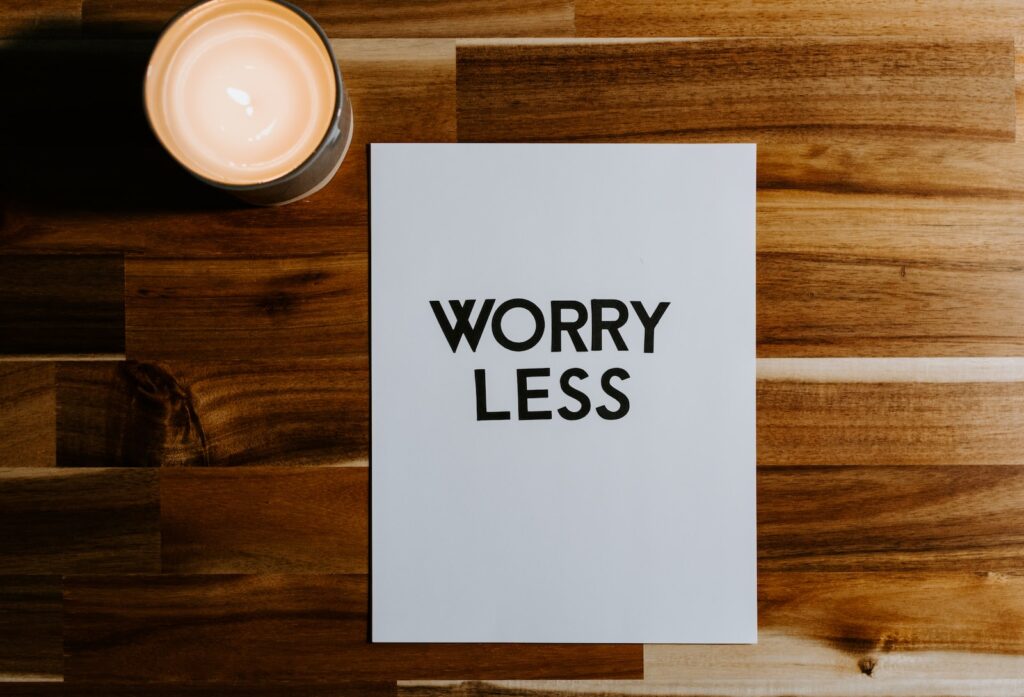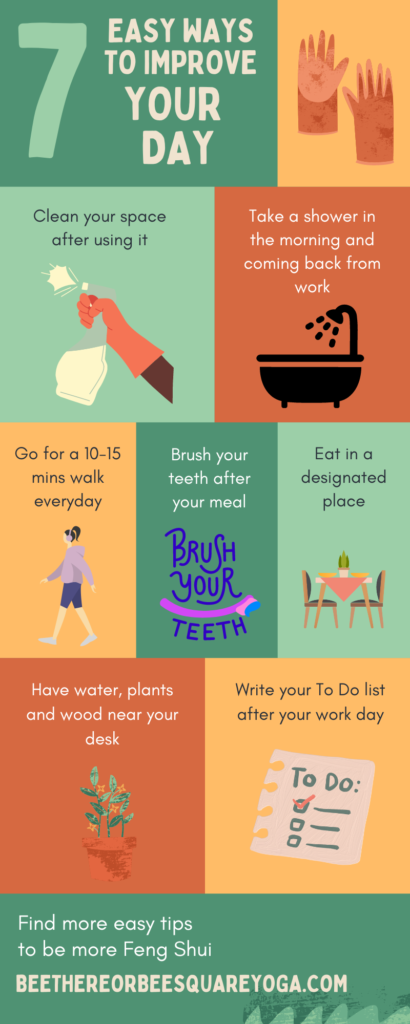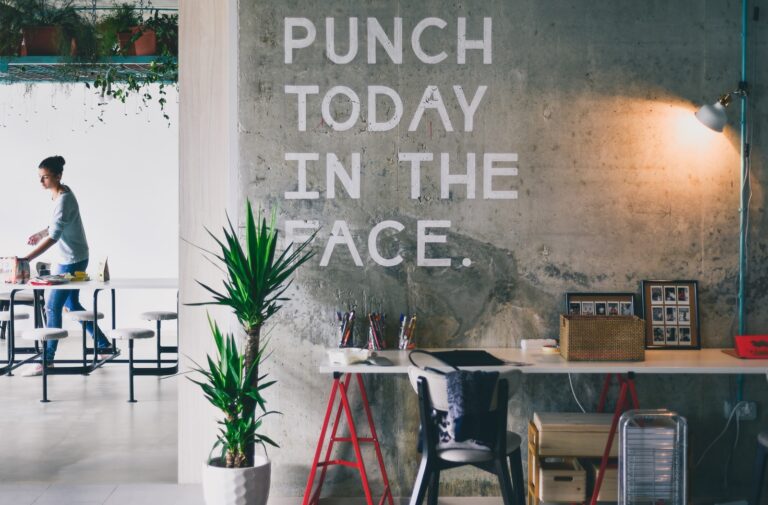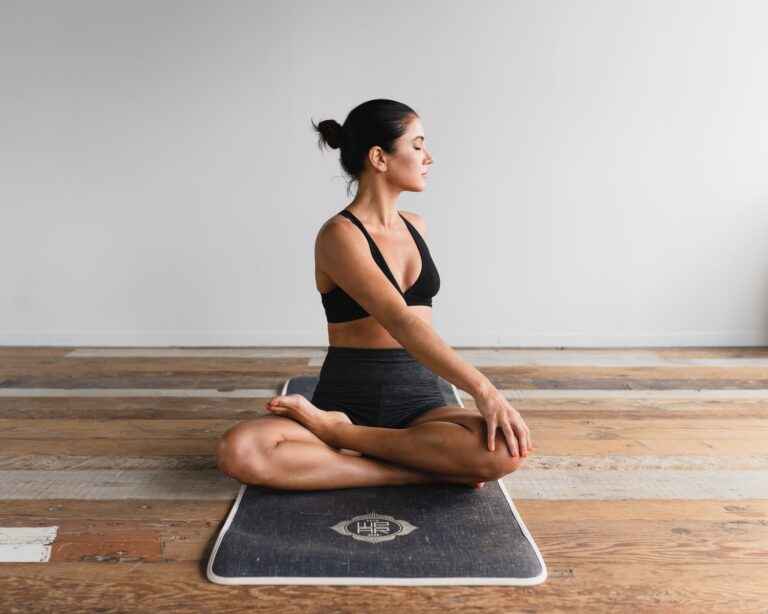25 Easy Feng Shui Principles & Examples to Reduce Stress
Whether you believe in energy or opening your chakras is not that mandatory to continue reading about Feng shui. We all know that having a clean home can reduce our stress. Believing in an energy force around us is one thing, but understanding why cleaning up your plate after eating could promote a more stable mindset is beneficial for everyone, especially you.
You may even apply some of these principles already, some make sense and some are part of our culture. Especially, when you start to seek a more positive environment around you.
The following list is separated into different parts of your day to make it easy to follow.
This post contains affiliate links, which means I receive a small commission, at no extra cost to you, if you make a purchase using this link, you may allow me to buy coffee while I write! Please see my disclosure for more details.

What is Feng Shui?
Feng shui is a form of Chinese art of harmonizing the energies in your daily life. According to its belief, Feng Shui can cumulate in your mind, body and all around you from your daily life. If used negatively, it can create heavy blocks of energy to stop the positive energy from entering. By changing your daily habits and cultivating a more positive atmosphere in your life you can change your behaviors, awareness and have a better understanding of your surroundings.
Why can certain Feng Shui Principles reduce stress?
By creating a healthy routine, we develop positive brain patterns, which can help us worry less about things that we do not have control over. Choosing to follow a good morning routine can help you change your grumpy morning feeling into a positive one. It needs to start with yourself, it is your responsibility to not spread negativity to yourself and others.
If you decide to be careless, distracted, rushed and always in a state of anxiety, irritation and hatred is the energy you will promote in your homes and to others.
Start your routine with a more positive and mindful morning with these 5 easy ideas.
The routine you choose can help you be more productive, reduce stress, improve relationships and set boundaries. By cultivating positive intentions and emotions in our behaviours you can reduce stress and anxiety, remove disharmony in our lives.
Example of Positive vs Negative Feng Shui Principles
| Positive Feng Shui | Negative Feng Shui |
|---|---|
| Lock the door when you are inside your home to create a place of safety. | Leave the front door unlocked. This creates the feeling that someone may come in. |
| Position your back against a wall instead of a door to promote a place of security, welcoming feeling and hospitality. | Position your back against a door, which creates the same vulnerability and tension that anyone can come in at any time. |
| Place objects back in their place, creating a sense of care and clarity in your mind. | Leaving a mess behind you will create careless, stagnant energy. |
| Taking time to be with your partner and family before leaving your house to wish them well and set a positive intention. This action promotes love and care for yourself and others. | Forgetting to say goodbye and hugs a loved one before leaving increase the feeling of seperation and lack of care and support. |
| Washing your clothes often removes negative energy and promotes care, purity and cleanliness. | Putting on the same clothes after bathing or showering increases the negative effect and allows old energy to remain. |
Positive Hygiene & Feng Shui
When we think of hygiene, we mostly think of being clean and smelling good. Mental hygiene is just as important for your personal growth and promoting a positive life for yourself and your loved one. Learning what are your limited beliefs and how to change them into positive ways of thinking can promote a healthier lifestyle.

Easy Feng Shui Principles to Follow
Feng Shui Morning Routine
1. Make your bed when you get up
This easy practice will help create a boundary between sleep and being awake, telling your brain that your day is starting.
Benefits of making your bed
- Creating positive mindset
- Avoiding to snooze
2. Shower or bathe before practicing yoga or meditation
It is believed that a shower or bath will help cleanse negative energy, making you feel more relaxed and assist in performing your daily yoga or meditation practice.
3. Wear fresh, clean clothes after taking your bath or shower
Would you want to wear old stinky socks? It should be the same for your old clothes. This will make you feel good and better, putting on your old clothes afterwards is believed to reinstate the negative energy you just attempted to wash away in the shower.
Feng Shui Meal Time Routine
4. Always eat from clean dishes
Always use clean, dried dishes when eating. Eating with unclean utensils or dishes can make you sick and bring bad energy. I do know it may be a practice to save time or because you are fed up, but these small actions can make it better or worse for your overall well-being.
5. Eat in a designated area
Avoid eating in the kitchen or at your desk. In your home, set a designated spot for eating your food, this can help to reduce snacking and overeating. Furthermore, it helps your brain differentiate between your activities and set proper boundaries.
6. Clean up after your meal, bring your dishes back
After each meal, immediately clean up your space and bring your dishes back to the kitchen. Leaving dirty dishes on the table attracts anxiety and can increase eating disorders.
7. Wash your hands after eating
These habits set the boundaries between eating time and digestion, the first step will be to wash your hands after eating.
8. Rinse your mouth or brush your teeth after your meal
This practice can help reduce the feeling of snacking and overeating, by telling your body that this is no longer a time for food. You now have cleaned yourself, your body and mind will be able to tell when to start digesting.
Feng shui routine during work
9. Work in a designated space in your home or office
This is especially important now with the rise of working from home. Find a designated space in your home or office where you do not relax or eat. If that is not possible, even setting a corner, where you can easily bring the distinction between your activities can help.
10. Do not eat at your desk
By eating at your desk, you will confuse your body and mind, the same principle applies to avoid working in your resting area.
11. Sit at your desk with a solid wall behind you or in front of the door
When you can see the door or you do know that you have a solid wall behind you, you can start to relax and reduce anxiety. By having a door behind you, you will be anxious about the noises you may hear.
12. Ensure you can see outdoors
Studies show that working in a room with natural light can reduce headaches and boost energy. We are not made to be cooped up inside all day like the chickens in “Chicken Run”. We all have to work but try to choose a space that has more natural light.
Where you sit can determine how focused you’re going to be at work. Workers close to windows were 51% less likely to experience eyestrain and 63% less likely to get tension headaches. Being close to natural light also boosted workers’ energy. Employees in optimized light reported a 56% decrease in drowsiness.
*Read More Here from the Ladders.com
Avazera Wellness Loose Leaf Tea Duo

This tea set features two of our premium loose-leaf tea wellness blends! Our high-quality teas can be steeped multiple times and make a perfect addition to any tea collection and a great gift!
Set includes:
- Avazera Chill-Out Tea
- Avazera Gut Love Tea
13. Balance your workspace
Balance your workspace with fresh air, a clean glass of water, wood furniture and some foliage.
14. Clean up your space after work
It’s all about boundaries. After your work day, clean up your space and file away your paperwork. Even if they will still have to be worked on the next day, do not leave them on your desk.
15. Put your computer away
Shut down your computer and put your laptop in a designated space away to avoid distractions. It’s important to set a designated time between work hours, play and relaxation.
16. Write at the end of each day your to-do list for the next day
Before leaving your office, write a To-do list for your next day’s work. This will help to reduce your stress and keep you focused at work.

General Feng Shui Principles
17. Avoid lying down or slouching during the day
It’s all about separating your days and certain actions will help your brain know this. It can help increase your energy and stamina during the day. By remaining upright and avoiding slouching or using a backrest, you can help your muscles support yourself and set your brain to understand the differences between muscle work and relaxation.
18. Go outside every day
By going outside even for 5 or 10 minutes each day you can reconnect with your environment, which can help reduce your anxiety and reduce depression.
19. Put shoes before going out of the house
If you are not used to being barefoot, the world can be sticky, full of pieces that should not be on your feet and weird. I do recommend walking barefoot outdoors when you can, but a designated space that is safe is better. Nobody should worry about being in danger by walking outside.
20. Avoid carrying your phone in your back pocket
If you are out, carry your phone in your bag instead of your pocket. When you are home, try to leave it in another room during a relaxing time and enjoy your evening with your family.
Feng shui routine, after work
21. Remove your shoes before entering your home
You never truly know what you may have walked on and what is under your shoes, by removing your shoes outside you avoid bringing toxins inside.
22. Put your jacket away
Similar to putting your dishes away after supper, putting your jacket and your bag away when you enter your home can reduce your stress and anxiety and calm your mind for more important activities.
23. Take a shower
After work, or even going out all day, taking a shower will help remove the energy from work and allow you to change your mindset. By setting your intention for a calm, relaxing time you will be able to be in the moment. If you can’t take a shower, simply washing your hands and feet can also work.
24. Change your clothes after your shower
Same as earlier, putting on your old clothes afterward is believed to reinstate the negative energy you just attempted to wash away. Change your clothes for your relaxing time and enjoy an evening in fresh, clean clothes.
25. Avoid technology in the evening
Setting a routine at night and turning off your devices, even putting them away from your bedroom can help promote better sleep.
Benefits of a Technology-Free Bedroom
- Using devices tends to delay the time when you go to sleep, reducing sleep duration.
- Technology affects the brain, stimulating your mind and making it harder to fall asleep.
- Sounds and blinking lights can cause unwanted awakenings when sleeping next to electronics.
- The blue light emitted by many devices disrupts the natural production of melatonin, a hormone that facilitates sleep and can throw off your circadian rhythm.
Summary of Feng Shui Principles
Feng Shui principles do not have to be complicated, the actions you decide can help reduce your stress and better separate your daily activities, which can help promote a more positive life.
Not all actions need to be completed to achieve mindfulness, but these actions can help promote a more loving and caring life for yourself and others.
To not miss any of my new articles, you can join my email list. I promise I don’t have time to send that many emails!






